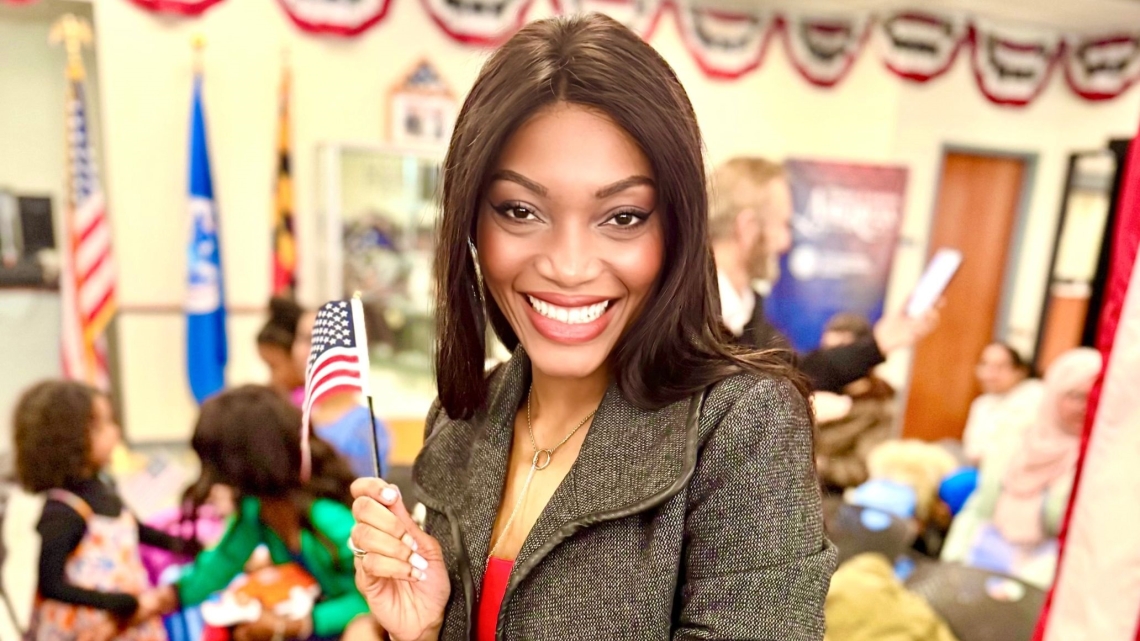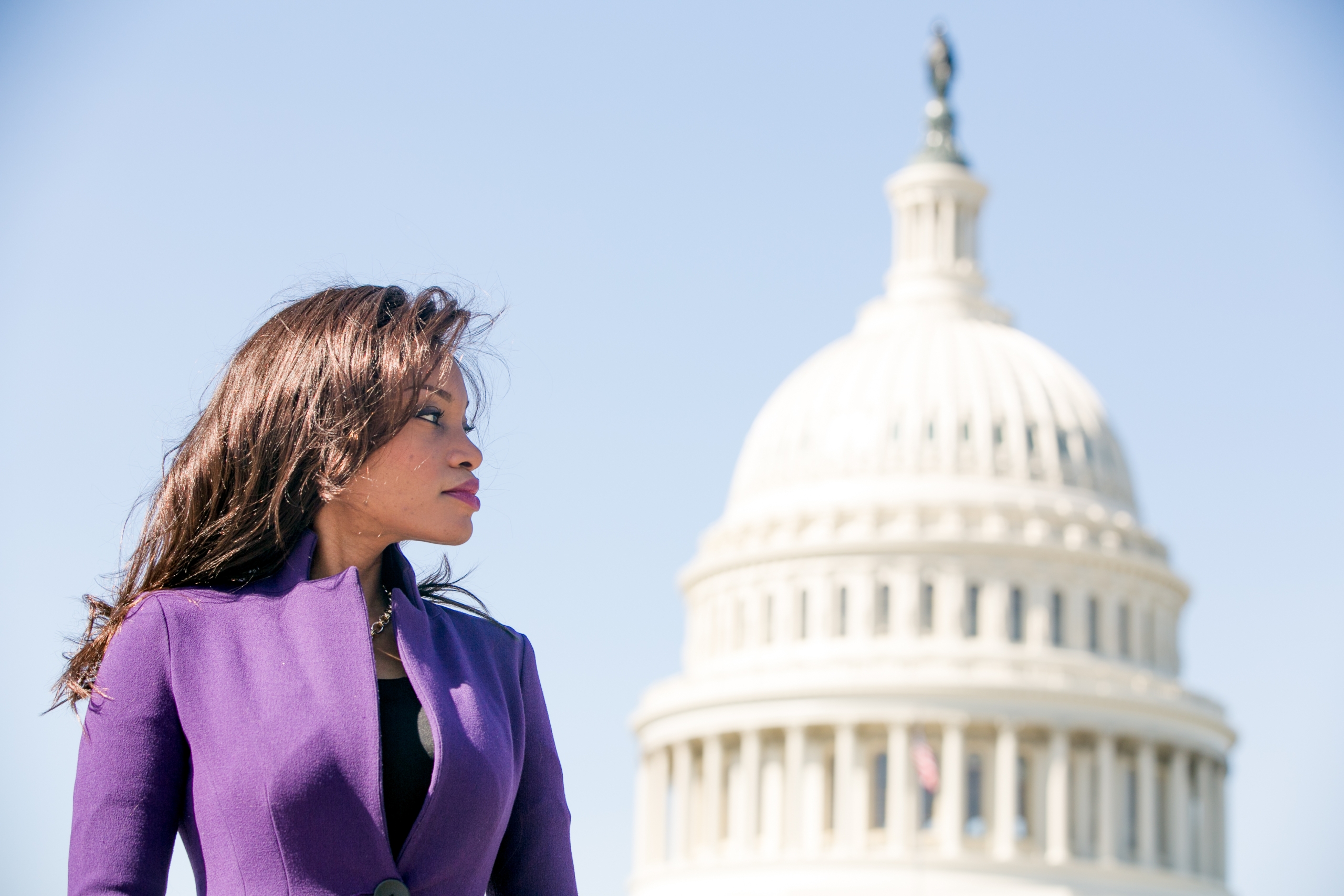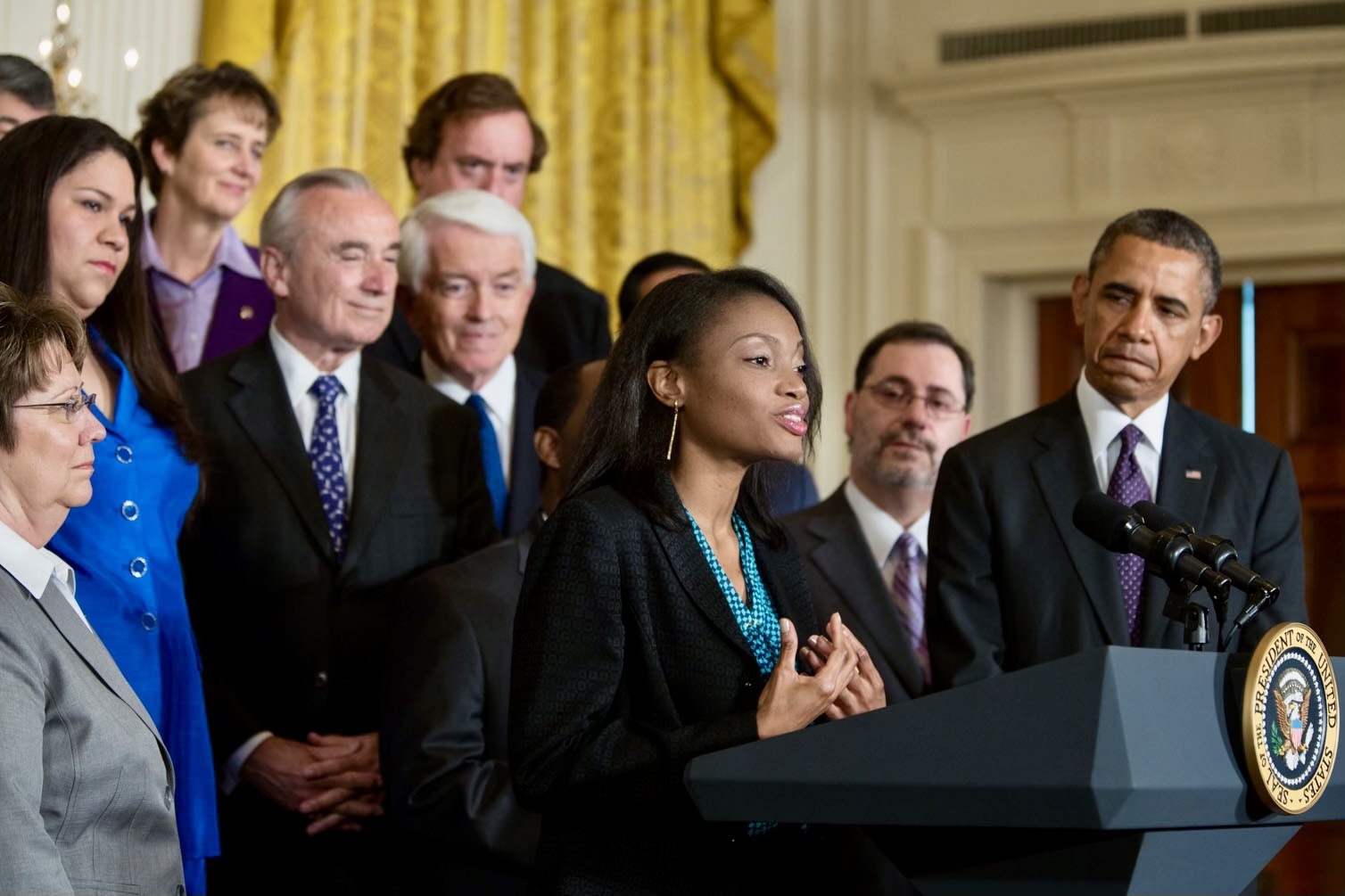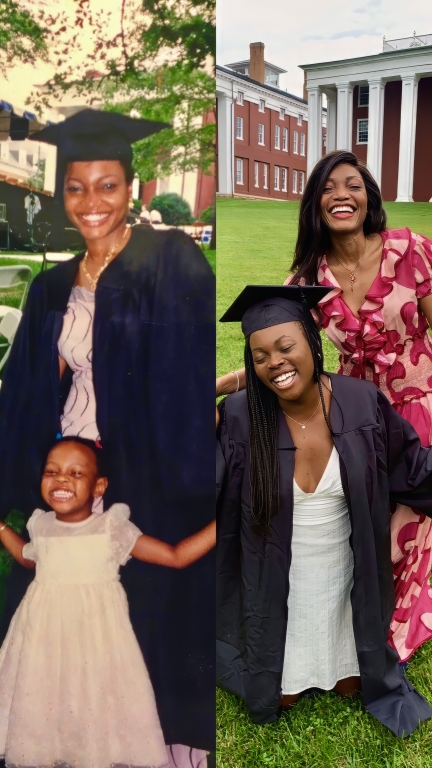Stories of Consequence

“It’s about striving for our highest ideals and actively engaging in democracy to protect life, liberty and the pursuit of happiness. Whether by an accident of birth or the will of migration, being a citizen means you have a responsibility to roll up your sleeves and contribute in some way.”
~ Tolu Olubunmi ’02
On Feb. 10, Tolu Olubunmi ’02, along with a small group of family and close friends, gathered together to give toasts and raise a glass to the achievement of a dream years in the making: Olubunmi’s swearing-in as a United States citizen.
“I’m still working on putting into words how I feel,” Olubunmi says. “It’s a goal and a milestone that I’ve been actively working toward for a very, very long time.”
Olubunmi, a native of Nigeria who holds a degree in chemistry-engineering from W&L, is one of the nation’s leading activists on behalf of immigrants and refugees. Olubunmi came to the U.S. in 1995, without her parents, in the wake of a coup in Nigeria. She was to be adopted by her aunt so that she could be in the U.S. with proper legal immigration documentation. Due to a delay in her paperwork being filed, however, Olubunmi lost her immigration status and has spent the last 30 years navigating the complexities of attaining her dream of becoming a U.S. citizen.
“People talk a lot about going through the ‘correct channels’ to pursue citizenship, but the reality is that there really aren’t any channels for people like me,” Olubunmi said.
Olubunmi’s path to citizenship was a complex journey. The loss of her legal status created substantial obstacles for her after graduating from W&L, forcing her to find alternative ways to survive and work, including starting her own hair care product line, editing an art book, tutoring middle school students and then finding her way to advocacy where she helped reshape the immigrants’ rights movement. Nearly two decades after leaving W&L, Olubunmi obtained an EB-1 green card, designated for individuals the government deems “of extraordinary ability.” Olubunmi said she remained resilient through years of financial struggles, temporary work permits and the constant threat of deportation because she dreamed of finally being able to experience the full benefits, both of what she had to offer the United States and what the United States had to offer her.
“I was tired of living with both my hands tied behind my back,” she said. “I was tired of being denied opportunities that I knew I’d earned, but, because of current circumstances, I couldn’t take full advantage of.”
Olubunmi says citizenship was not just a personal achievement for her but a platform to amplify immigrant voices and promote active engagement in our democracy. That was the mission central to her recently established nonprofit, How to Speak American (HTSA), a pro-democracy, culture-shifting campaign using the power of storytelling to amplify the voices of new Americans. The organization’s name is derived from the story of her attempts to assimilate into her Washington, D.C., area high school shortly after arriving from Nigeria. At the time, the movie “Clueless” was a recent hit, and Olubunmi recalls working hard to adopt the California Valley accent of the movie’s main character when speaking to her American classmates.
“That longing to belong and be a part of something bigger than you is at the heart of HTSA,” Olubunmi says, “using humor and storytelling to celebrate our everyday moments of integration — the small yet defining experiences that shape belonging.”

Olubunmi was initially skeptical about Washington and Lee, having planned to attend Princeton University or a large engineering school. However, her perspective changed dramatically during an admitted students weekend, when she visited the local Walmart.
“I mean, I stepped out and just took in the view from the parking lot, and it was breathtaking,” Olubunmi said. “It was gorgeous.”
This unexpected moment of beauty, combined with her experience on a campus where she felt more like a person than a number, convinced her to choose W&L. Despite being a city girl who expected to attend a big school, Olubunmi fell in love with the campus, the Speaking Tradition and the personal attention she received from faculty and upper division students. The financial support she received from the university also made the decision more appealing, leading her to choose a college that was completely different from her original plans. Olubunmi, who now serves on the Board of Advisors for the Williams School of Commerce, Economics, and Politics, notes her undergraduate years at W&L were a turning point in her life in many ways.
“I remember taking a chemistry class during my sophomore year, and I’d never been challenged academically before like I was in that class. I loved every second of it,” Olubunmi says. She set her sights on a B.S. in chemistry-engineering, becoming the only woman to graduate with the degree from her class year.
Olubunmi’s journey after graduation held an entirely different set of challenges, as her undocumented status presented barriers to finding employment. Her immigration attorney at the time told her that her only options were either to wait for a change in U.S. law or to marry a U.S. citizen. The attorney advised Olubunmi to find “a nice young man and get married.”
“What I heard him say was that there are two options: a change in U.S. law or marriage to a U.S. citizen. I said, ‘All right, I’ll change the law,’” Olubunmi says.

In 2008, Olubunmi began as an unpaid volunteer with the National Immigration Law Center, a nonprofit instrumental in lobbying Congress on the DREAM Act, a legislative proposal introduced in 2001 to provide legal status to individuals brought to the U.S. as children. Despite bipartisan support, the bill has remained stalled in Congress for decades. In response to this inaction and after extensive advocacy by immigrant youth, including Olubunmi, former President Barack Obama created the Deferred Action for Childhood Arrivals (DACA) program in 2012. DACA offers temporary protection from deportation and work permits to eligible undocumented youth, though it lacks the permanence of legislation and has faced ongoing legal challenges. Although approximately 834,000 individuals have benefited from DACA, Olubunmi was ineligible by just four months due to the program’s age cutoff. Nonetheless, she was featured on the cover of TIME magazine alongside 32 other DREAMers the day DACA was announced — three of whom, like Olubunmi, did not qualify. Despite the personal setback, Olubunmi says the moment was a powerful and memorable milestone.
“It’s always my goal with the work that I do – to have the people who are directly affected by whatever issue I’m working on feel empowered,” Olubunmi says. “To have them feel like they have ownership of their own destiny, to support them as active participants in making the changes necessary to get them to where they want to be in life, to resolve the issues facing them or their communities. I believe the blueprint for solutions are often in the hands of the people directly affected by an issue even though they might not be the ones with the power to move things forward. That is why you work hand in hand with those in power to get things done.”
In 2010, Olubunmi founded Ada Consulting, which managed communications strategies for a coalition of national immigrants’ rights, education, labor and civil rights organizations to advance the DREAM Act. She is also the founder of Lions Write, which partners with leaders and organizations to craft narratives, build coalitions and drive social and systems change. The name of that initiative originated from her favorite African proverb, “Until the lions learn to write, all the stories will glorify the hunter.”
Olubunmi served as director of the United Nations’ global climate action campaign, ActNow, and as a member of the U.S. Board of Directors for the International Organization for Migration. She co-founded Immigrant Heritage Month, has helped draft and execute U.S. immigration policies and was named by the World Economic Forum in 2015 as one of 15 Women Changing the World and as an Outstanding Woman Entrepreneur. The Anti-Defamation League has honored her work, and her story has been shared many times in national and international media outlets.
Olubunmi says she believes that sharing personal narratives can help break down stereotypes. How to Speak American also works to move participants from storytelling to active participation in civic life, empowering new Americans to make meaningful change in their communities.
“Speaking American is not about giving up any part of yourself — it’s about giving of yourself to your new nation,” she says. “It’s about striving for our highest ideals and actively engaging in democracy to protect life, liberty and the pursuit of happiness. Whether by an accident of birth or the will of migration, being a citizen means you have a responsibility to roll up your sleeves and contribute in some way.”
Olubunmi said that W&L is also evolving while remaining true to its time-honored spirit of community. She said she was honored to have been asked to help shape conversations about the future of a place that welcomed her from the beginning and said each time she has returned to campus she has felt affirmed.
“It really does feel like, ‘We’ve missed you, welcome home and great job with everything you’ve been doing,’” Olubunmi said.
Olubunmi has also committed to connecting with W&L through campus visits and speaking engagements, particularly since the arrival to campus of her niece, Ayo Ehindero ’21. Ehindero, a strategic communications major who is now a marketing strategist, said her aunt was one of the main reasons she considered W&L and that their bond has only been strengthened by their shared experiences and love for the university.
“Seeing her reconnect with W&L is one of the reasons I agreed to help co-chair our fifth-year reunion,” Ehindero said. “There’s something really special about staying engaged with a community that played such a big role in shaping who you are. Any opportunity to come back and reconnect with that space serves as a powerful reminder of how far you’ve come, how much you’ve grown and even what still resonates with you. Sometimes, you revisit moments you didn’t realize would have such a lasting impact — and doing that five, 10 or 15 years later gives you the chance to reflect on who you were, who you are now and who you’re becoming.”
